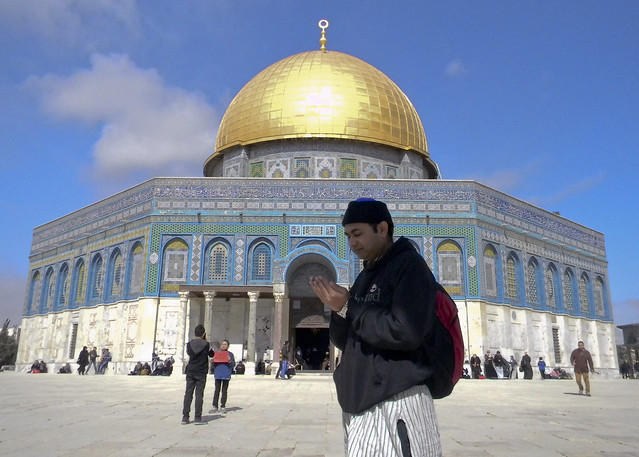Zulfiqar Sheth is a doctoral fellow at Aligarh Muslim University. Zulfiqar is right now on India’s Visiting Research Fellowship at Hebrew University Jerusalem. He observed first few rozas at Al- Aqsa masjid, Jerusalem. He says “Peace and prosperity is an urgent need of this world. May this Ramdhan bring peace and prosperity not only for people of Palestine but for the whole world.”
By Zulfiqar Sheth for TwoCircles.net
Aroma of Shwarma, Hummus , olives and falafel, visibility of Qatayef, strollers laden with jars upon jars of carob juice and tamarind juice, markets buzzing with people, lights and decorated streets, selling of Medjoul dates, sweets and snacks everywhere, crowded roads to Al-Aqsa – This is the Ramadan in this generous land.
Praying at mosques during the Ramadan is one of the most common Ramadan Traditions. Muslims all over the world prefer to pray at mosque especially Maghrib (sunset) and Tarawih ( optional night) prayers. Palestine is no exception. However, people here are so lucky as they get to pray in Al Aqsa Mosque one of the holiest sites in Muslim Religion, as it used to be Muslims’ first Qiblah.
Iftar at Al-aqsa
One of the examples of Palestine specific Ramadan culture is the precise rituals related to the Iftar gatherings at Al Aqsa Masjid. People assemble in the masjid’s compound before Iftar, and break their fast with dates, water and other drinks like carob juice, tamarind juice, almond juice etc . Then have their Iftar meal in the mosque’s yard, enjoying the outdoors in the company of the Mosques beautiful surroundings.
I observed many organisations as well as individuals organizing common Iftars at Al Aqsa Mosque, where they get to feed many fasting people which is considered to be highly rewarded practice. These common Iftars are not only meant to feed those in need, but are also for anyone present, as many people work in Jerusalem but don’t live there, and some would not make it back home in time for Iftar, so they too can enjoy these Iftar meals. Other than the organised communal Iftars, it is very common for people to take their Iftar meal, in picnic style and have it at the Mosque’s yard. After Iftar, people go out and hang in markets nearby mosque. The coffee shops are a very common choice, where people go for Arabic coffee.
Palestinian Iftar and Ramdhan Special Food
As I have noticed to be the case with most people, the most popular choice of food during Ramadan is usually traditional food. Qatayef, carob juice, tamarind juice, dates, several desserts like Kanafeh, Baklawa, Warbat are popular in Ramadan. Dishes like fattehs (Layered platters of bread/rice, meats and vegetables), Maqloobeh (Upside down pot of rice, meat and vegetables in many variations) and Qidreh (A dish of caramelised onions, meat, rice and whole hummus) are common during the holy month. Stuffed vegetables, soups and Kehwa (Arabic tea) are consumed daily in Ramadan.
Palestinian Suhoor
Ramdhan markets in Jerusalem are full of mouth-watering food, sweets and drinks. If one is not full eating delights from the markets, and if he/she is at home in the time for Suhoor then a typical Ramadan Suhoor should include: Hawader (ready foods – a meal with what you have – drawing from the Arabic word for “what is there”.) and Nawashef (sauce less foods). Hawader include za’atar (a kind of herb), curd, olives, grilled cheese, eggs, manaqeesh (pita bread topped with thyme, cheese, or ground meat), maqdoos (nut-stuffed eggplants that are pickled in olive oil). Hummus, milk, dates and falafel are also common Suhoor items.
The Palestinian people wait for Ramadan with a great deal of anticipation. Ramadan is hugely celebrated, and has a unique spirit here. From the philosophy and spirituality side, camaraderie, to the observance of Iftar and the Ramadan night rituals and activities to breaking fast with the family (which in the Palestinian sense includes all Palestinians) to exchanging visits and gathering at the Al Aqsa. Palestinian are very lively people- They appreciate life and celebrate it together as one family.
Although Ramadan is a Muslim celebration, the non-Muslims in Palestine too celebrate with their Muslim neighbors and friends. It is very common to be invited to Christian friend’s/neighbor’s home for Iftar during Ramadan and vice versa. Ditto applies to exchanging visits and celebrating Christian festivities and occasions.
(Acknowledgement : Author acknowledges that some inputs are taken from a blog published on dimasharif.com)

